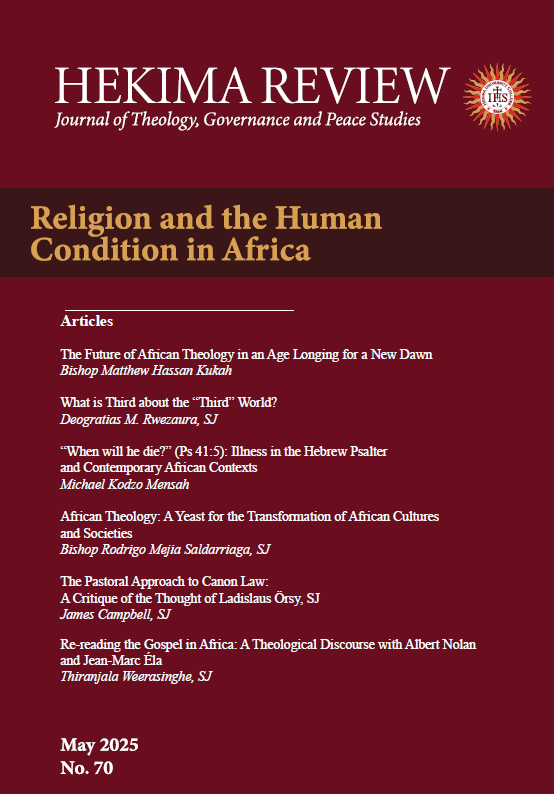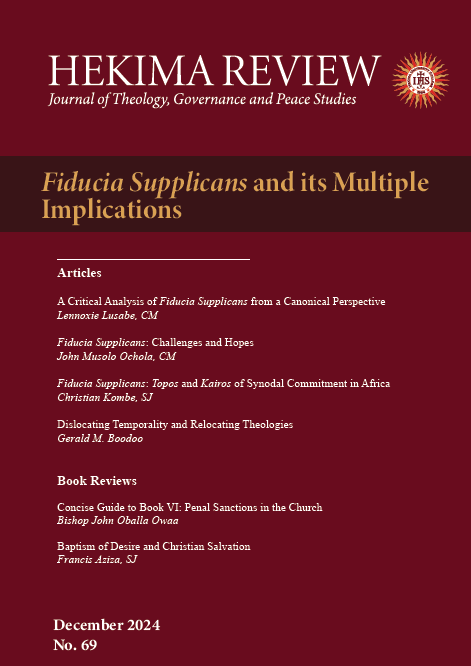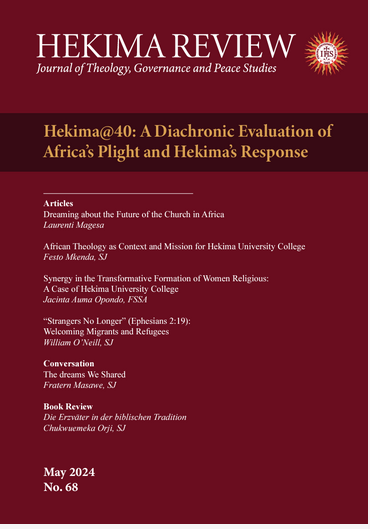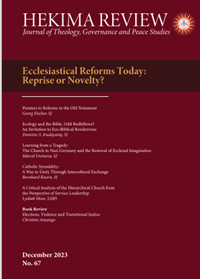Archives
-

Hekima Review No. 70 May 2025
The call for papers on this issue underscored the paradoxical reality of many Africans, particularly the apparent disconnect between singing believers and sinking citizens. In reality, the continent is far from reaping the dividends of religion. Most African streets have no resemblance to the serenity and beauty of cultic sanctuaries within their respective geographical contexts. The more religion flourishes in Africa, the more the conditions of life seem to worsen. The more religious devotees increase, the more the continent witnesses an increase in conflicts and wars. Although the term “human condition” refers to the state of being of a person or people, encompassing the human experience of love and loss, communality and loneliness, joy and sadness, as well as wondrous and woeful feelings, the tendency to consider it to be synonymous with suffering, woes, and tragic experiences based on the day-to-day existential dynamism of Africans, is not far-fetched.
-

Hekima Review No. 69 December 2024
Exactly a year ago, in December of 2023, at the heart of the Advent liturgical season, as Christians prepare with great anticipation for the celebration of the incarnation of Christ at Christmas, the Catholic world woke up on the 18th day of the month to an unexpected declaration published by the Dicastery for the Doctrine of the Faith (DDF) – Fiducia Supplicans (On the Pastoral Meaning of Blessings). This declaration has generated mixed sentiments and provoked extreme reactions. On the one hand, it has been suspiciously perceived as the Church’s concrete move and openness towards a sacramental validation of a possible same-sex union. On the other hand, the declaration presents many flaws, inconsistencies, and contradictions regarding doctrines and the sacraments. This tension suggests that the declaration seems torn between pastoral charity and doctrinal orthodoxy. Hence, to obtain its theological ‘reputability’, it seems Fiducia Supplicans must satisfactorily navigate and convincingly establish the balance between pastoral creativity and doctrinal fidelity.
-

Hekima Review No. 68 May 2024
The invitation to story-telling indicates a significant triadic gain. Firstly, story-telling is revelatory. It discloses the existence of the narrated. This way, the listening audience learns about a world beyond their immediate and enclosed cosmos, a space outside of their familiar space. Secondly, this revelatory sphere creates an enabling environment for epistemic possibilities. Here, story-telling reveals more than mere existence to disclose capabilities. Thirdly, similar to the case of Achebe’s lion, story-telling has a teleological agenda; it is in the telling that glorification becomes a relishable reality. As such, story-telling discloses existence, exposes capabilities and unfolds purpose.
-

Hekima Review No. 67 (Dec 2023)
The discourse on reforms has increasingly become multi-disciplinary. In many cases, conservative versus liberal opinions mar the process of reforms. Yet, engaging in reforms simply implies the readiness for perspectival shifts, embracing new changes, and rebranding good old habits. Reforms imply a thoughtful and deliberate back-and-forth shift in responding to existential realities.
-

Hekima Review No. 66 May 2023
In his literary classic What Is Not Sacred, Laurenti Magesa alludes to a triadic empirical-transcendental-sacramental constituent of African spirituality. This manière d’être resonates with the biblical claim (Gen 1:31) that everything created is good. However, human relation with creation does not always guarantee sacramental and transcendental experiences. How then should creation be appropriately admired without tragic consequences? An aesthetic assessment of what is (not) sacred deserves due investigation.
-

Hekima Review No. 65 Dec 2022
Attention is shifting in recent times from contextual theology to intercultural theology, from inculturation to interculturation. The discourse on this practice is not new. About thirty years ago, in 1993, Cardinal Joseph Ratzinger declared to the Bishops of Asia: “We should no longer speak of inculturation but the meeting of cultures or interculturality.”
-

Hekima Review No. 64 May 2022
On the eve of African independence, the Christian theological discourse in Africa was still elaborated in the logical continuation of the foundation of Christianity, that of a pre-Christian culture from a historicist perspective. By 1956, African priests had begun to radically question Christian colonial salvation, a fact that some have seen as the beginning of African theology. After nearly 65 years, one wonders where we are in the practice of this discipline, which was initially very promising. Indeed, African theology had the wind in its sails after the Second Vatican Council. During this assembly, Pope John XXIII opened the windows of the Church to the world.
-

Hekima Review No. 63 Dec 2021
The year 2021/2022 offers a unique opportunity to commemorate the 500th anniversary of the Conversion of St Ignatius to a radical following of Christ. Injured in battle at Pamplona on 12th May 1521, Ignatius lay convalescing in his family home in Loyola reading the Life of Christ and the Lives of the Saints through much of July and August. By September, those around him began to suspect that ‘he wanted to make a very great change’ in his life, having seen several outward changes. Among those changes was his growing appreciation of the value of religious poverty, a value which was to characterize the life of the religious order he founded, the Jesuits.
-

Hekima Review No.62 Dec 2020
“But, where sin increased, grace overflowed all the more” (Rom. 5:20b), declares St. Paul. The biblical text echoes hope in apparently hopeless situations. The COVID-19 pandemic, arguably, constitutes a sin that has brought about lots of suffering around the globe. People cannot travel as much as they would like to for fear of contracting or spreading the disease. Churches have experienced closure to the effect that religious practitioners cannot freely gather to give praise to their Creator. Schools closed pending amelioration of the COVID-19 pandemic. People have prematurely lost their jobs, and an endless list of lamentations accompany the pandemic.
-

Hekima Review No. 61 May 2020
Over the past few decades, there has been an increased level of self-consciousness on the African continent. Our political self-consciousness has grown, our economic self-consciousness continues to see a steady rise, and our theological self-consciousness has significantly advanced. One factor that explains this growth in consciousness is the realization of the value of Socrates’ famous aphorism, which I paraphrase as Africa know thyself and to thyself be true. Self-knowledge and self-examination are, therefore, a critical determinant in the development of our theological consciousness into theological self-consciousness.

